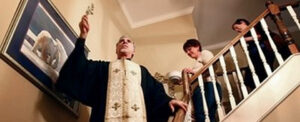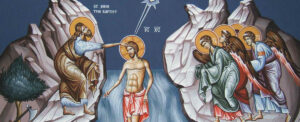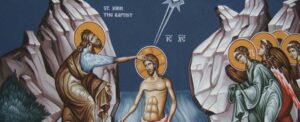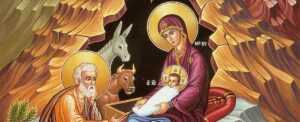When thou, O Lord, wast baptized in the Jordan, the worship of the Trinity was made manifest; for the voice of the Father bore witness to thee, calling thee his beloved Son, and the Spirit in the form of a dove confirned the truth of his words. O Christ our God, who hast revealed thyself and hast enlightened the world: Glory to thee! (Troparion for Theophany).
Glory to God the Father, to the Son, and to the Holy Spirit. Amen.
Happy Sixth Day of Christmas! We’re in the middle of two weeks of fast-free celebrating. Traditionally, during these twelve days, Orthodox Christians are often in one another’s homes, either bringing gifts or simply spending a little time together. We’re not farmers, so mid-winter is not time off from work for most of us, but it’s healthy to make time for hospitality, even if your house is in its normal, messy state. If your tree hasn’t become a complete fire hazard, keep it up until Theophany. Make spiced cider or wine, have your favorite meals and treats. My family had a few kinds of cookies and cakes we only ever baked at Christmas, and it was always a comfort to be reminded to make and eat these again. If you love holly and evergreens and mistletoe, then go ahead and keep the house full of Christmas cheer till Theophany.
In the hymns of the coming week, you’ll hear the theme of the manifestation of God. Theophany literally means the manifestation or revealing of God. We sing the same thing every day at Matins, “God is the Lord and has revealed himself to us…”
Specifically, in the coming feast of Theophany we will see the revelation of the one God in three Persons, the Trinity.
Visit any Orthodox service, and one of the first things you will notice is the Trinity. Everything is in the name of the Father, the Son, and the Holy Spirit. Anything worth doing is worth doing three times.
Our non-Christian friends also believe in one God. Some of them shake their heads at our insistence that the Father, Son, and Holy Spirit are one God. Does it matter?
Honestly in a lot of today’s Christianity the Trinity does not matter. It’s in their denomination’s Statement of Faith, but there’s not much connection between the Trinity and real life. It seems like a weird accessory, bolted unnecessarily onto a simple Jesus religion.
If your whole Gospel is, “Jesus died so you can be forgiven and go to heaven,” then it’s hard to explain why the Trinity is a doctrine to defend, other than the fact that it’s always been so. This is like the way many Evangelicals baptize – not because their baptism does anything, but because the Lord commanded it. And they have the Lord’s Supper every month, not because they expect to receive the Body of Christ, but just because the Lord commanded it. It’s a thing you do because it’s a thing you do.
But the Holy Trinity is not one of the doctrines of Orthodox Christianity; it is the root and foundation of all our belief and practice, our dogma and ethics, our salvation and our God.
Apologists and catechists often begin by arguing that something exists, or can exist, that can be called god. French writer Blaise Pascal called this “the god of the philosophers.”
They assemble logical arguments to demonstrate that it is legitimately arguable – maybe even necessary – to say that a deity of some kind exists.
But logic requires you to start with some kind of given information you agree (or assume) to be true. The Latin word things given is data.
Both the data you start with and your reasoning have got to be accurate, or else your logic won’t tell you anything reliable. But if I accept the data you start with, and each proposition and induction you make, then at the end we might be able to agree on a proposition.
Thing is, God is not a proposition. God IS.
The difference is that propositions exist in your head. But reality is what still exists when you stop thinking about it. And while the philosophers and debaters are over there hammering out their logical conclusions about the deity, over here simple fishermen and saints and unpretentious disciples are meeting God face to face.
Back in 1980, when I heard the unfamiliar word “Trinity,” I asked a Christian friend, and he gave me an excellent, very Orthodox answer.
He said: The Church has experience of three divine Persons. They’re called the Father, the Son (that’s Jesus) and the Holy Spirit. But all three of them insist they are one God. So when we say “God” we might mean any one of them, or all three Persons. We don’t explain or rationalize the Trinity; instead we confess it and celebrate it.
He said this is not a conclusion that we figured out – it’s what the Church has received from God. It’s data. It’s where we start. And, like the four Gospels, the Church’s experience of God comes before any doctrines and conclusions.
The saints tell us, in essence, “Here is my firsthand experience of God. And if you want the same experience of God, then here is what I did and how I got this way, and you can too.”
In the New Testament, we encounter a God who is not only capable of love, but in Saint John’s words, God is love (1 John 4:8). That is, love is not just a thing God gives or does – love describes God’s nature.
And here is why the fact of the Trinity matters: Before the heavens and the earth were created, before human beings or angels existed, God is love. The three divine Persons of the holy Trinity relate to one another in love, from eternity to eternity, before God the Word ever spoke anything else into being. Before there was anyone else to love, from age to age, the three divine Persons love one another.
In other words, as important as the fact that God is, is the fact that God loves.
There is danger in reasoning from our experience to describe what God is like. We need to shape out understanding in the other direction: As there is perfect love among the three divine Persons of the Godhead, so our marriages, our families, and our parish community should be.
“Each of us has one body with many members, and these members do not all have the same function; so in Christ, though we are many, we form one body, and each member belongs to all the others” (Romans 12:4-5).
There’s a quote attributed to Saint John Chrysostom: “The husband and wife should be like the hand and the eye. When the hand hurts, the eyes should weep. And when the eyes cry, the hand should wipe away the tears.”
Fr John Romanides wrote about the misunderstanding that says “Love your neighbor as you love yourself.” He was corrected by a rabbi who told him that in Hebrew the command “Love your neighbor as yourself” can only be interpreted as: “Love your neighbor as BEING yourself.” The other person is not other than you in essence.
In this life we see only dimly the reality that we are eight billion persons who share a single human nature.
We catch a glimpse of that reality when we feel empathy for one another, when we become peacemakers, and reconcile people or communities that have been alienated. When we “Rejoice with those who rejoice; mourn with those who mourn” (Romans 12:15).
This is what the Lord prayed to the Father for us, “That they all may be one; as thou, Father, art in me, and I in thee, that they also may be one in us” (John 17:21).
Have I used up my one Greek word for the day yet? No? Then here you go: Perichṓrēsis means being in the same place. Saint Maximus the Confessor used it to mean being inherent in one another. Saint John Damascene used this word when he wrote that the three Persons of the Trinity “are made one, not to combine, but to cleave to each other, and they have their being in each other.”
Trivia: the root word of perichṓrēsis is almost identical to a word for dancing, so it has also become a word for a circle dance. When we face each other and make space for one another, there is a place for each person within the dance. We aren’t merged into a single big person, but we join in a single action.
The love of God for mankind and for us personally is the Holy Trinity in action. God’s overflowing, exceeding, abundant generosity is inherent in the nature of God.
Does God love you? The answer is not about you; it’s about God. Your performance can’t change the nature of God; you don’t have the power to make God love you less or more. “He causes His sun to rise on the evil and the good, and sends rain on the righteous and the unrighteous” (Matthew 5:45). And he “demonstrates his own love toward us, in that while we were still sinners, Christ died for us… when we were enemies we were reconciled to God through the death of his Son” (Romans 5:8,10).
And so the Lord commands us to become like him, to “love your enemies and pray for those who persecute you, that you may be children of your Father in heaven” (Matthew 5:44-45).
All our doctrine and practice goes back to the reality that God the Father, the Son, and the Holy Spirit are one God, acting on the world from the overflow of their love.
In practical terms, “Do nothing from selfish ambition or conceit, but in humility count others more significant than yourselves. Let each of you look not only to his own interests, but also to the interests of others. Let this mind be in you which was also in Christ Jesus, who, though he was in the form of God, did not count equality with God a thing to be grasped, but emptied himself, by taking the form of a servant” (Philippians 2:3–7).
“If anyone desires to be first, he shall be last of all and servant of all” (Mark 9:35).
There is a direct line from the three Persons of the Godhead, through our doctrines of creation and salvation and sanctification, to our way of life as people created and loved and brought home by the Father, the Son, and the Holy Spirit. It’s a mistake to pursue a moral catechism as a list of rights and wrongs; our life in Christ originates in the agápē love of the Godhead, the threefold oneness that shows us who we are as “members of one another.”
Robert Coleman once said, “Show me your gods and I will show you your people. Because we become like those we worship. Worship a god of war and I will show you a warring people. Worship a god of licentiousness and you will live a life of license. But worship a Holy God and you will strive to become holy.”
God created us so that the joy the three divine Persons of the Trinity have in one another might be our joy (John 15:11). We worship the source of love and abundant life, flowing from the overflowing steadfast love of the Trinity, because God is love. Taste and see firsthand that the Lord is good (Psalm 33:8).
Come, let us worship and bow down to the Holy Trinity, one in essence and undivided: the Father, the Son, and the Holy Spirit, now and ever and to the ages of ages. Amen.






